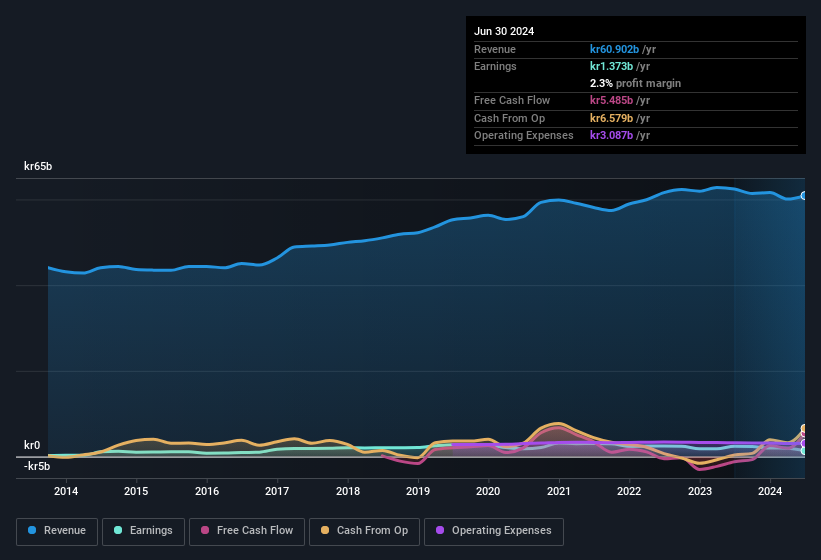- Sweden
- /
- Construction
- /
- OM:PEAB B
Peab's (STO:PEAB B) Conservative Accounting Might Explain Soft Earnings

Peab AB (publ)'s (STO:PEAB B) recent soft profit numbers didn't appear to worry shareholders, as the stock price showed strength. We think that investors might be looking at some positive factors beyond the earnings numbers.
View our latest analysis for Peab

Zooming In On Peab's Earnings
One key financial ratio used to measure how well a company converts its profit to free cash flow (FCF) is the accrual ratio. The accrual ratio subtracts the FCF from the profit for a given period, and divides the result by the average operating assets of the company over that time. This ratio tells us how much of a company's profit is not backed by free cashflow.
That means a negative accrual ratio is a good thing, because it shows that the company is bringing in more free cash flow than its profit would suggest. That is not intended to imply we should worry about a positive accrual ratio, but it's worth noting where the accrual ratio is rather high. Notably, there is some academic evidence that suggests that a high accrual ratio is a bad sign for near-term profits, generally speaking.
Peab has an accrual ratio of -0.13 for the year to June 2024. That implies it has good cash conversion, and implies that its free cash flow solidly exceeded its profit last year. To wit, it produced free cash flow of kr5.5b during the period, dwarfing its reported profit of kr1.37b. Notably, Peab had negative free cash flow last year, so the kr5.5b it produced this year was a welcome improvement. Having said that, there is more to the story. We can see that unusual items have impacted its statutory profit, and therefore the accrual ratio.
That might leave you wondering what analysts are forecasting in terms of future profitability. Luckily, you can click here to see an interactive graph depicting future profitability, based on their estimates.
How Do Unusual Items Influence Profit?
While the accrual ratio might bode well, we also note that Peab's profit was boosted by unusual items worth kr150m in the last twelve months. While it's always nice to have higher profit, a large contribution from unusual items sometimes dampens our enthusiasm. We ran the numbers on most publicly listed companies worldwide, and it's very common for unusual items to be once-off in nature. And that's as you'd expect, given these boosts are described as 'unusual'. If Peab doesn't see that contribution repeat, then all else being equal we'd expect its profit to drop over the current year.
Our Take On Peab's Profit Performance
Peab's profits got a boost from unusual items, which indicates they might not be sustained and yet its accrual ratio still indicated solid cash conversion, which is promising. After taking into account all these factors, we think that Peab's statutory results are a decent reflection of its underlying earnings power. With this in mind, we wouldn't consider investing in a stock unless we had a thorough understanding of the risks. While conducting our analysis, we found that Peab has 3 warning signs and it would be unwise to ignore these.
Our examination of Peab has focussed on certain factors that can make its earnings look better than they are. But there are plenty of other ways to inform your opinion of a company. For example, many people consider a high return on equity as an indication of favorable business economics, while others like to 'follow the money' and search out stocks that insiders are buying. So you may wish to see this free collection of companies boasting high return on equity, or this list of stocks with high insider ownership.
New: Manage All Your Stock Portfolios in One Place
We've created the ultimate portfolio companion for stock investors, and it's free.
• Connect an unlimited number of Portfolios and see your total in one currency
• Be alerted to new Warning Signs or Risks via email or mobile
• Track the Fair Value of your stocks
Have feedback on this article? Concerned about the content? Get in touch with us directly. Alternatively, email editorial-team (at) simplywallst.com.
This article by Simply Wall St is general in nature. We provide commentary based on historical data and analyst forecasts only using an unbiased methodology and our articles are not intended to be financial advice. It does not constitute a recommendation to buy or sell any stock, and does not take account of your objectives, or your financial situation. We aim to bring you long-term focused analysis driven by fundamental data. Note that our analysis may not factor in the latest price-sensitive company announcements or qualitative material. Simply Wall St has no position in any stocks mentioned.
Have feedback on this article? Concerned about the content? Get in touch with us directly. Alternatively, email editorial-team@simplywallst.com
About OM:PEAB B
Peab
Operates as a construction and civil engineering company in Sweden, Norway, Finland, Denmark, and internationally.
Excellent balance sheet, good value and pays a dividend.
Similar Companies
Market Insights
Community Narratives



